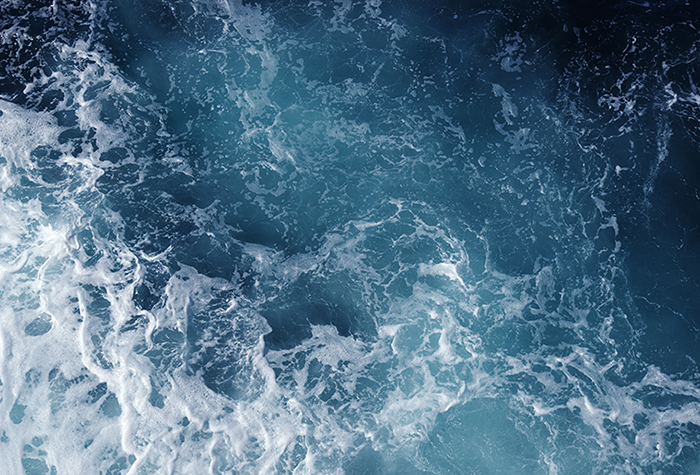Interviews / Ocean
11 May 2022
The Sea, an Increasingly Geopolitical Issue.

At a time when maritime ambitions in the Indo-Pacific are crystallizing, when Europe aims to adopt a new strategic compass, and as France reflects on the determinants of its power and sovereignty, maritime spaces represent a significant geopolitical issue and reveal new strategic ambitions. Digital connectivity, biotechnology, renewable energy, overexploitation, trafficking, and pollution… the challenges surrounding the world’s lungs are numerous. Why is the sea at the heart of power and governance issues? As a cornerstone of the climate system, have states fully grasped its significance? A discussion with Julia Tasse, researcher at IRIS and head of the Climate, Energy, and Security Program. She recently co-authored “Géopolitique de la mer” (Eyrolles) with Sébastien Abis.
Why is the sea increasingly being discussed as a geopolitical issue?
Good question. The answer is multifactorial. On one hand, we are reaching the limits of possible exploitation on land, and, in the face of population needs and the associated political challenges, we are turning our attention to what remains exploitable—the sea. One economic reason for this growing interest in the ocean can be identified. We are witnessing a race for marine resources, from fish stocks to critical metals, as well as the exploitation of offshore oil and gas. Any economic activity requires a stable and regulated framework, so there is an increasing focus on regulating maritime spaces more than they already are. These economic activities often revive historical disputes and sometimes serve as justifications for controlling maritime zones. The politics of faits accomplis frequently arises when we discuss the geopolitics of the sea.
This politics of fait accompli also, and especially, responds to political ambitions. In fact, there is a maritime reflection of the return of power, and this is particularly evident through military investments: naval fleets are being strengthened, with more high-seas vessels and submarines. China is a striking example, as its military fleet has grown significantly over the past few decades. Tension zones, such as the Indo-Pacific, are at the center of research by many institutions, showing the return of the oceanic space as a place of power.
We have also understood, and this is at the heart of the book we offer, that the sea is the cornerstone of the climate system, upon which our survival depends, as well as of our globalized economy. Witnessing the degradation of the ocean alarms and mobilizes us. The sea is a determinant for the continuity of our ways of life. This issue is attracting particular attention from major maritime states, but also from UN spheres, which are at the heart of ocean governance and responsible for the better management of this shared space.
What governance rules is the sea subject to? And what are the consequences? Are they sufficient?
The ocean is divided into several major areas. To simplify (if you’d like to know more, feel free to consult our book), here is a schematic. The maritime spaces close to the coast are under the jurisdiction of coastal states and are governed by national laws and regulations. A broader area, called the “exclusive economic zone,” grants the coastal state rights over economic activities within it. Further out, there are international waters, where human activities are governed by international conventions (on fishing, human rights, etc.) and by the state under whose flag the ship sails.
The governance of the ocean is indeed complex and fragmented. The responsibilities of states vary, from managing an entire area to monitoring, research, and rescue of distressed ships, to regulating ship activities. The first thing to realize is that, despite this array of rules, it is very difficult for states and international agencies to know exactly what is happening at sea. The fragmentation of governance further complicates regulation, as do the conflicting interests of states. I wouldn’t say these rules are insufficient, but our global means of enforcing them are. Furthermore, since international waters are governed by conventions, any modification requires global consultation, extending the implementation timeline. It is within the negotiations around these conventions that power struggles are expressed.
The sea faces numerous challenges, one of which is its plasticization, which is becoming ecologically unsustainable. Have states and international bodies fully grasped the scale of this issue?
States and international bodies have recognized the urgency of taking action. What we call the Anthropocene is partially defined by humans’ imprint on the Earth, particularly manifested by the widespread presence of plastic, even in the sediment layers that future geologists will study to understand the planet’s evolution. As we advance in our discoveries, we become more aware of the scale of the plastic problem. In fact, we recently (January 2022) established that the associated planetary boundary has been exceeded.
But more concretely, it is very difficult to do without plastic, which is practical, durable, and disposable. The pandemic reminded us of our dependence on disposable plastic (masks, gloves, testing devices). A recent United Nations Environment Assembly, held in February 2022 in Nairobi, Kenya, allowed the approval of a resolution aimed at ending plastic pollution. The idea is that an intergovernmental negotiating committee will draft a proposal for a legally binding international agreement by the end of 2024. This initiative is exciting, but we must remain realistic: recycling or plastic treatment chains are global and fallible, it is the production that needs to be regulated. However, economic interests are significant, from producers to users, for whom plastic is cheaper and often more convenient than other materials. The end of plastic pollution must first involve reducing plastic production and usage, a considerable challenge.

